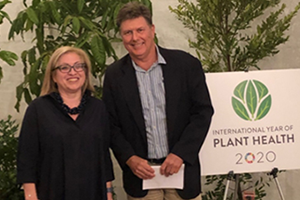Reflecting on the International Year of Plant Health in Australia

Michelle Portelli and Steven Smith at the Australian IYPH launch.
By Michelle Portelli, Australian International Year of Plant Health Coordinator
2020 was declared the International Year of Plant Health (IYPH) by the United Nations (UN) General Assembly and as the year draws to a close, we can reflect on the opportunities we had to raise global awareness on the importance of plant health.
As a member of the global plant health network and one of 184 contracting countries to the UN’s International Plant Protection Convention, Australia had an extremely important role to play in this year.
The Australian Government Department of Agriculture, Water and the Environment lead the IYPH in Australia and a steering committee for the IYPH2020 in Australia was established comprising of departmental staff and representatives from Plant Health Australia, peak industry bodies and other key stakeholders. To help coordinate key activities and to implement the Australian IYPH Communication and Engagement Strategy, I was appointed the IYPH Event Coordinator. My position was funded through the Plant Biosecurity Research Initiative, a partnership between the Australia’s plant research and development corporations (RDCs).
The aim of the IYPH activities in Australia were to:
- increase awareness of the importance of plant health
- highlight the importance of involvement by the broader community
- promote the work of the RDCs and the governments in contributing to Australia’s plant health
- coordinate and communicate the IYPH activities and events across Australia.
The year was launched in Australia at Parliament House on the 6 February. Mr David Littleproud, Federal Minister for Agriculture opened the year. At the launch a special video from Director General of FAO Mr Qu Dongyu was also played.
A number of activities were planned across the year, in collaboration with RDCs, federal and state government departments and other industry bodies, however, with the COVID-19 pandemic reaching Australia these events were cancelled. To adjust to the changing environment we initiated a range of digital projects while still coordinating and developing projects for when COVID-19 restrictions eased.
One of the digital projects we undertook was sharing profiles of everyday plant health heroes to highlight the many people working to support plant health, often behind the scenes. With 38 profiles showcasing heroes ranging from school students to researchers to CEOs, we were able to raise awareness of how diverse the plant biosecurity community is and how they hard they work keep our plant life healthy.
With a key aim of the IYPH being to emphasise the importance of involvement of the broader community, we partnered with the Queensland Government Department of Agriculture and Fisheries Hermitage Schools Plant Science Competition to sponsor conference registrations for two of the winning students. Through this sponsorship we hope to provide two budding future scientists with the opportunity to further their interests in plant health.
Working with Greenlife Industry Australia (GIA), we also supported a young student in Tasmania who was replanting the school wetlands and building bee hotels, in the hope of promoting a healthier environment and to grow the local bee population. Members of GIA donated suitable plants to ensure the project was completed successfully. An article about the project was published in the GIA newsletter.
The largest project of the year started in November, the installation of a bush tucker garden at Cobargo Primary School in collaboration with the Royal Botanic Garden Sydney Youth Community Greening team. The aim of the project was to support a farming community that was severely affected by the January 2020 bushfires. The garden was designed and installed by Cobargo Primary School’s students and will be maintained by them with ongoing support from the Youth Community Greening team.
Read the Australian IYPH 2020 Project Final Report to learn more.
